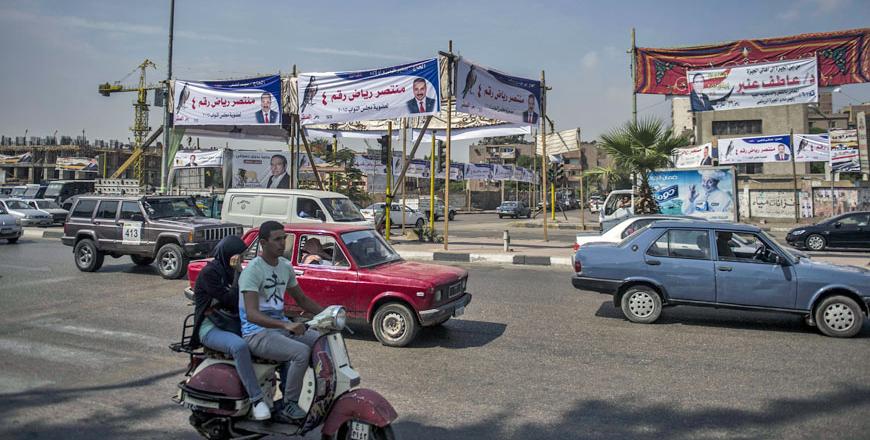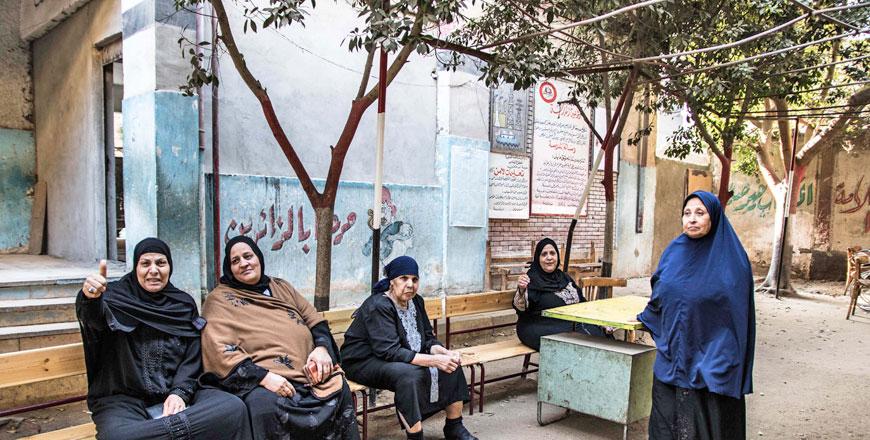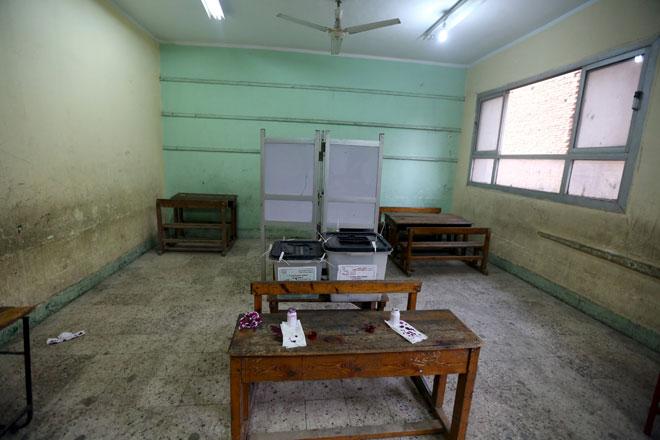You are here
Former Egyptian general sees his bloc leading new parliament
By Reuters - Oct 09,2015 - Last updated at Oct 09,2015

Egyptians drive past banners advertising candidates for the upcoming parliamentary elections in the Giza district of the capital Cairo on Monday (AFP photo)
CAIRO — A former intelligence officer who heads the largest loyalist coalition running in Egypt's upcoming elections expects his bloc to lead the new parliament and eventually seek to curb the legislature's wide-ranging powers.
Egypt's first parliamentary election in three years is due to begin on October 18, the final step in a roadmap President Abdel Fattah Al Sisi says is aimed at restoring democracy.
The new parliament will comprise 568 members — 448 elected on an individual basis and 120 through winner takes all lists.
Sameh Seif Elyazal, an ex-general who now heads a pro-government think tank, said his "For the Love of Egypt" alliance would compete for all list seats and draw on individuals to form a large bloc that can pursue its legislative agenda.
"We are coordinating with the individuals so that we can have an independent parliamentary bloc ... that can lead parliament," he told Reuters in an interview at his wood-panelled office in Cairo.
Egypt has been without a parliament since June 2012 when a court dissolved the elected main chamber, then dominated by the Muslim Brotherhood, reversing a major accomplishment of the 2011 uprising that toppled Hosni Mubarak.
Then army chief Sisi ousted elected president Mohamed Morsi of the Brotherhood the following year, after protests against his rule, and went on to win a presidential vote in 2014.
The parliamentary vote promised by the army was repeatedly postponed but will now take place over two rounds, ending in late November.
Egypt's constitution endows the new parliament with wide powers. On paper, it can reject the president's choice for prime minister or withdraw its confidence in him. It can block him from sacking the government, even impeach the president himself.
Speculation is rife that the constitution, passed in a referendum held after Morsi's removal in July 2013 but before Sisi became president, would be amended to curb those powers.
"Give it a year, a year-and-a-half, two years maximum, we will see what really does need to be amended in the constitution... In my view there are some articles in the constitution that we should look at a bit seriously and see what we can do with them," he told Reuters.
"For example, the issue of appointing and removing ministers, the naming of the prime minister..."
In the absence of a parliament, Sisi has wielded legislative power, passing some laws that critics say curb freedom to protest or expand the remit of military courts. The constitution calls for parliament to pass or reject these within two weeks.
"I see this as impossible, 15 days and 300 laws... In my view, we should approve these laws and debate them afterwards," Seif Elyazal said.
The brothers' return?
Since Morsi's ouster, the Muslim Brotherhood, Egypt's oldest Islamist movement, has been banned and branded a terrorist group. A crackdown has seen thousands of its members jailed.
Youth activists at the forefront of the 2011 revolt have also found themselves behind bars for protesting without permission from the police.
In their absence, some political parties say the elections offer no choices. They criticise the emphasis on individuals as a throwback to Mubarak-era politics, which favoured candidates with wealth and connections over parties.
Yet with Mubarak's National Democratic Party (NDP) gone, loyalists have struggled for over a year to form alliances to secure Sisi a sizeable bloc of parliamentary support.
"For the Love of Egypt" has emerged as the most influential alliance, incorporating 10 major parties including the Free Egyptians founded by billionaire Naguib Sawiris.
Though laden with establishment figures, Seif Elyazal denied his alliance was government-backed. He said the elections did offer choice, predicting the Islamist Nour Party could win 5 or 6 per cent of individual seats.
Sisi and his allies have justified the clampdown against the Brotherhood by calling the mainstream Islamists an existential threat to the Arab world and the West.
"I can assure you the Brotherhood will be in parliament," said Elyazal. "The Brotherhood will enter parliament as independents and will reveal... once they have won, that they are Brotherhood."
Related Articles
CAIRO — Egyptians voted on Tuesday in run-off elections for more than 200 parliamentary seats in which no clear winner emerged in the first
CAIRO — Egyptians voted on Sunday in the second phase of elections that are meant to restore parliament after a more than three-year gap but
CAIRO — Egyptians largely stayed away from parliamentary elections for a second day on Monday, highlighting growing disillusionment since th













